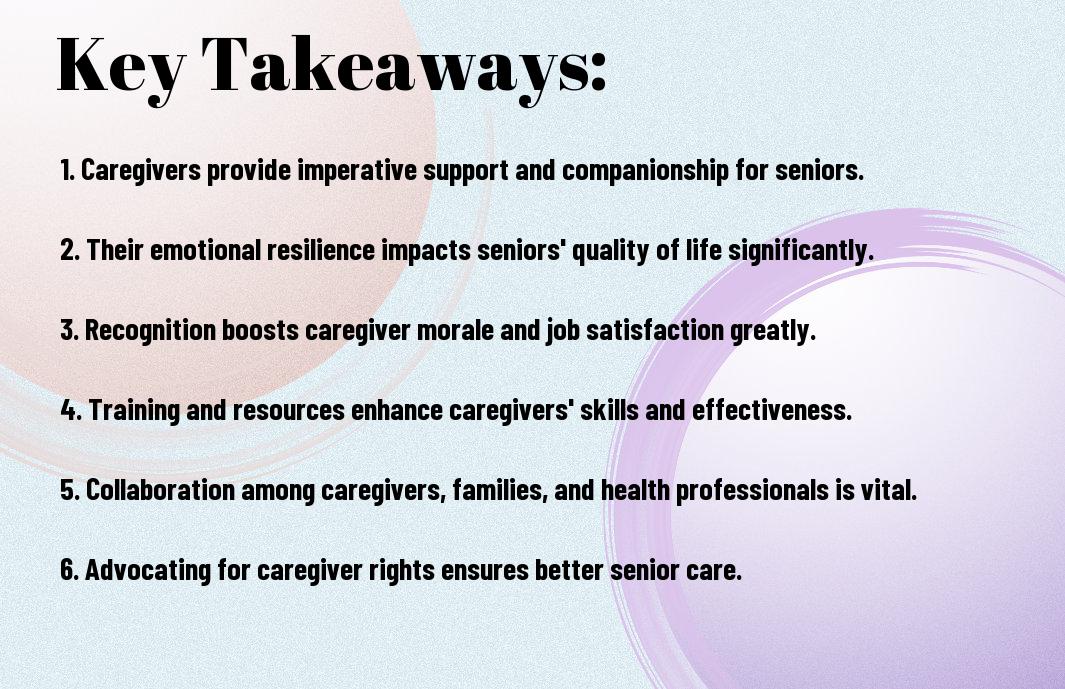It’s crucial to acknowledge the invaluable contributions of caregivers in senior care, as they often work tirelessly behind the scenes. They provide compassionate support and important assistance to elderly individuals, ensuring their safety and well-being. These caregivers not only enhance the quality of life for seniors but also endure significant emotional and physical challenges in the process. By shining a light on their dedication and sacrifices, society can better appreciate the critical roles they play in fostering dignity and respect in the golden years of life.
Key Takeaways:
- Valuable Contributions: Caregivers play an crucial role in enhancing the quality of life for seniors, often going above and beyond to ensure their comfort and well-being.
- Emotional and Physical Support: The efforts of caregivers provide critical emotional support and physical assistance, enabling seniors to maintain independence while receiving necessary care.
- Acknowledgment and Appreciation: Recognizing and appreciating the hard work of caregivers is vital for their morale and well-being, fostering better working environments and improved care outcomes for seniors.

Understanding Caregiving
Your journey into caregiving reveals the critical yet often overlooked support that caregivers provide in senior care. These dedicated individuals play a pivotal role in enhancing the quality of life for seniors, ensuring their well-being and dignity are upheld in challenging times.
Definition of Caregiving
An imperative aspect of healthcare, caregiving involves not only the physical assistance with daily activities but also the emotional support required for seniors to thrive. Caregivers are individuals who tirelessly devote their time and energy to those in need, prioritizing their comfort and security.
The Role of Caregivers in Senior Care
Definition emphasizes that caregivers in senior care are the backbone of many families’ support systems. They provide vital assistance with activities of daily living, such as bathing, dressing, and medication management, which can be daunting for seniors dealing with health issues. They not only ensure safety but also offer companionship, significantly improving mental health.
Caregiving can often be a physically demanding and emotionally taxing responsibility, requiring comprehensive knowledge and immense patience. Caregivers are responsible for monitoring their charges for any changes in health, which can sometimes lead to dangerous situations if not promptly addressed. Nonetheless, the positive impact of their work is immeasurable, as they foster a sense of independence and dignity for seniors, making daily life more manageable and enjoyable. Their commitment profoundly enriches the lives of the individuals they care for, representing an unwavering source of support and compassion.

Challenges Faced by Caregivers
There’s no denying that caregivers encounter numerous challenges while providing support to seniors. From managing daily tasks to navigating the complexities of medical care, their responsibilities can be overwhelming. The emotional toll, coupled with the physical demands, often leads caregivers to experience burnout, isolation, and a decline in their own health and well-being. Understanding these challenges is crucial in recognizing the immense effort they contribute to senior care.
Emotional and Physical Strain
Any caregiver can attest that the emotional and physical strain associated with their role is significant. They may grapple with feelings of anxiety or guilt, worrying about the quality of care they provide. The physical demands of caregiving can lead to fatigue, stress, and even chronic health issues, making it vital for caregivers to prioritize their own well-being.
Financial Impacts
Physical challenges often intertwine with profound financial impacts for caregivers. The burden of providing care can lead to increased expenses, such as medical bills, specialized equipment, and home modifications. Many caregivers also find themselves reducing their work hours or leaving their jobs entirely, resulting in lost wages and financial instability.
Faced with the reality of an escalating financial burden, caregivers often experience a profound impact on their overall quality of life. They may incur expenses for medications, medical equipment, or even home modifications, which can quickly accumulate. Furthermore, those who reduce their work hours or leave their jobs may face loss of income, placing added stress on family finances. Without appropriate support systems in place, caregivers may also struggle to manage day-to-day living costs, leading to a vicious cycle of financial strain that can hinder their ability to provide effective care.
The Impact of Caregiving on Seniors
Unlike other aspects of healthcare, the role of caregivers profoundly affects the daily lives of seniors. Through personalized support and companionship, caregivers provide imperative assistance that enriches the emotional and physical well-being of older adults. Their efforts lead to improved daily functioning, social interaction, and an overall enhancement of quality of life, thereby ensuring that seniors can maintain their dignity and independence in the later stages of life.
Quality of Life Enhancements
Life for seniors significantly improves with the dedicated support of caregivers. They help facilitate social engagement, manage daily activities, and provide emotional reassurance, allowing seniors to experience a more fulfilling and involved lifestyle. This support fosters a sense of belonging and purpose, which is crucial for their mental and emotional well-being.
Health Benefits for Seniors
Caregiving contributes uniquely to the health of seniors. It not only addresses their physical needs but also plays a vital role in mental health and emotional stability.
This support helps seniors mitigate risks associated with isolation and depression, which are prevalent in older age. Regular interaction with caregivers promotes physical activity and healthier eating habits, leading to enhanced nutrition and mobility. Moreover, caregivers assist in medication management and routine health monitoring, reducing the risk of medical complications. Ultimately, the comprehensive care provided by caregivers supports not just physical health but also nurtures emotional and social well-being, contributing to a holistic improvement in seniors’ quality of life.
Recognizing Caregiver Contributions
Not enough attention is given to the invaluable contributions caregivers make in senior care. Their tireless efforts not only enhance the quality of life for seniors but also instill a sense of dignity in their daily routines. By acknowledging the resilience and compassion caregivers embody, society can foster an environment that truly appreciates their indispensable role.
Community and Family Support
One significant aspect of recognizing caregiver contributions lies in the support provided by the community and family. Caregivers often rely on their loved ones and local resources to balance their demanding roles while ensuring that seniors receive the care they need. This support network plays a crucial role in enabling caregivers to maintain their mental and emotional well-being.
Awards and Recognition Programs
Community organizations and healthcare providers understand the importance of celebrating caregivers through various awards and recognition programs. These initiatives aim to highlight the exceptional work caregivers do and promote a culture of appreciation within the community.
Caregiver awards and recognition programs serve as a powerful tool in honoring those who dedicate their lives to aiding seniors. They can spotlight extraordinary achievements, offer visibility to the often overlooked challenges caregivers face, and inspire others to become involved in caregiving. Furthermore, these programs reinforce the message that dedication, compassion, and hard work do not go unnoticed. Ultimately, they create a sense of pride and belonging among caregivers, encouraging them to continue their important work and enhancing community support for this vital profession.
Resources for Caregivers
Despite the challenges faced by caregivers in senior care, numerous resources are available to support them. These invaluable tools can help caregivers enhance their skills, manage their responsibilities, and find solace in knowing they are not alone in their journey. From community programs to online platforms, there is a wealth of information at their fingertips.
Support Networks
Networks play a crucial role in providing caregivers with emotional support and practical advice. She may benefit from connecting with local community groups or online forums where she can share her experiences, receive encouragement, and gain insights from others who understand her challenges.
Educational Materials
To empower caregivers, access to educational materials is vital for enhancing their knowledge and skills. Understanding best practices in caregiving can greatly improve the quality of care they provide while ensuring their own well-being.
The availability of educational materials such as books, online courses, and workshops is vital. These resources can cover vital topics, including effective communication techniques and stress management strategies. They help caregivers develop a deeper understanding of *geriatric care*, enabling them to handle the complexities of senior care with confidence. By investing time in educational resources, caregivers can foster a more fulfilling experience for themselves and their loved ones.
The Future of Senior Care
Many experts believe that the future of senior care will increasingly rely on the dedication and skills of caregivers. As society recognizes the vital role they play, it’s vital to Caregivers: Honoring and Appreciating Our Unsung Heroes for their tireless commitment to improving the quality of life for seniors.
Evolving Roles of Caregivers
On the frontline of senior care, caregivers are adapting to fulfill new responsibilities that go beyond traditional tasks, emphasizing emotional support and holistic care, which are crucial as the demographics of seniors continue to change.
Technological Advancements in Caregiving
Caregivers are increasingly utilizing technology to enhance the quality of care they provide. Devices such as health monitoring wearables and telehealth systems are becoming indispensable tools in their daily routines, enabling them to offer better and more timely support to seniors.
For instance, smart home technology can help seniors maintain independence by reminding them when to take medications or alerting caregivers about potential falls. This proactive approach dramatically reduces risks and enhances safety. Additionally, virtual communication tools allow caregivers to stay connected with healthcare professionals, ensuring that seniors receive necessary interventions quickly. With the integration of such innovations, caregivers can focus more on personalized care and less on administrative tasks, ultimately leading to a more enriched and fulfilling experience for seniors.
Summing up
Taking this into account, recognizing the vital role of caregivers in senior care is crucial for honoring their unwavering dedication and commitment. They provide not only physical assistance but also emotional support, enriching the lives of those they care for. Acknowledging their contributions fosters a culture of appreciation and encourages the continued development of supportive resources. He, she, and they all play a crucial role in enhancing the quality of life for seniors, and it is imperative that their efforts do not go unnoticed or unappreciated.
FAQ
Q: What are the primary responsibilities of caregivers in senior care?
A: Caregivers in senior care play a crucial role in enhancing the quality of life for older adults. Their primary responsibilities include assisting with daily living activities such as bathing, dressing, and meal preparation. They also provide companionship and emotional support, administer medications, monitor health conditions, and ensure safety in the home environment. Caregivers may also coordinate with healthcare providers to facilitate medical appointments and manage care plans, crucial for maintaining the overall well-being of seniors.
Q: How can society better recognize and support caregivers in their roles?
A: Society can take several steps to better recognize and support caregivers. First, increasing public awareness about the vital role caregivers play in senior care through campaigns and educational programs can help foster appreciation. Additionally, developing policies that provide financial support, respite care options, and mental health resources can alleviate some burdens caregivers face. Acknowledging caregivers’ efforts during community events or creating caregiver recognition days can also reinforce their importance, helping them feel valued for their contributions.
Q: What are some common challenges faced by caregivers in senior care, and how can they be addressed?
A: Caregivers often face a variety of challenges, including physical and emotional strain, social isolation, and a lack of resources. To address these issues, it is crucial to provide them with adequate training that includes stress management techniques and access to support groups where they can connect with others in similar situations. Implementing flexible work schedules and offering regular breaks can prevent burnout. Additionally, online platforms and local community resources can connect caregivers with crucial services and respite care options to ease their workload.

